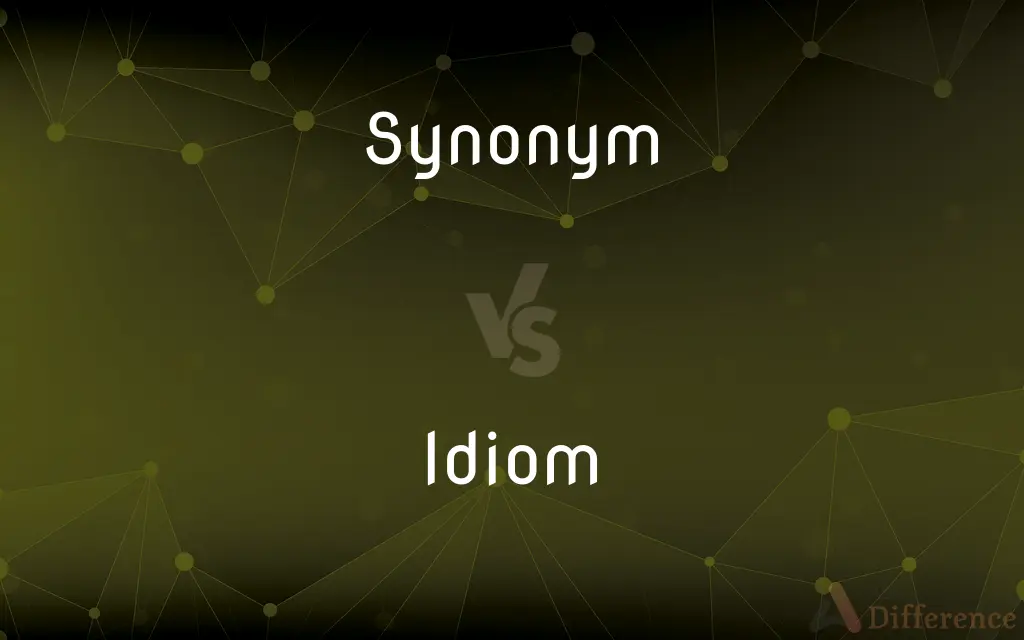Synonym vs. Idiom — What's the Difference?
By Fiza Rafique & Maham Liaqat — Updated on April 24, 2024
Synonyms are words with similar meanings, such as 'happy' and 'joyful', enhancing language precision; idioms are fixed expressions like 'piece of cake', adding cultural nuance and metaphorical depth.

Difference Between Synonym and Idiom
Table of Contents
ADVERTISEMENT
Key Differences
Synonyms are words or phrases that can be used interchangeably in various contexts without changing the meaning of the sentences where they are used. On the other hand, idioms are expressions whose meanings cannot be deduced from the meanings of the individual words they are composed of.
The use of synonyms often serves the purpose of avoiding repetition in speech and writing, making communication clearer and more varied. Whereas, idioms add a colloquial or cultural layer to language, often conveying complex ideas in a more digestible or relatable way.
Synonyms are integral to enhancing vocabulary and are frequently taught as part of language education to help develop language fluency. Conversely, idioms are taught to aid in understanding cultural contexts and to help non-native speakers grasp more nuanced aspects of a language.
While synonyms can be directly translated into other languages with equivalent words maintaining the same meaning, idioms often lose their significance or change meaning when translated, reflecting their intrinsic cultural specificity.
Lexicographers document synonyms in thesauruses, emphasizing their interchangeability and variations in usage depending on context. Idioms, however, are often collected in phrasebooks or specific idiom dictionaries that explain their meanings and origins, highlighting their fixed and metaphorical nature.
ADVERTISEMENT
Comparison Chart
Definition
Words with similar meanings, interchangeable in some contexts
Fixed expressions with meanings not deducible from individual words
Purpose in Language
Enhance vocabulary, avoid repetition
Add cultural nuance, convey complex ideas succinctly
Educational Focus
Vocabulary development, language fluency
Cultural context, nuanced language understanding
Translation
Usually direct, maintaining meaning
Often culturally specific, potentially losing meaning
Documentation
Thesauruses
Phrasebooks, idiom dictionaries
Compare with Definitions
Synonym
A word that has the same or nearly the same meaning as another word.
'Fast' is a synonym for 'quick'.
Idiom
Often used to express a concept in a vivid and imaginative way.
'Spill the beans' is an idiom used to describe revealing a secret.
Synonym
Used to enrich text and avoid repetitive word use.
Using 'terrified' as a synonym for 'scared' can enhance a story's descriptions.
Idiom
Rich in metaphorical meaning, contrasting with literal interpretation.
'It's raining cats and dogs' vividly describes heavy rain.
Synonym
Essential for effective communication and writing.
Knowledge of synonyms is crucial for crafting persuasive essays.
Idiom
Challenging for language learners due to non-literal meanings.
Understanding idioms is often a significant hurdle in mastering a new language.
Synonym
Variability in usage based on context.
'Youthful' and 'young' are synonyms, but their connotations can differ slightly.
Idiom
An expression whose meaning is not predictable from the usual meanings of its constituent elements.
'Kick the bucket' is an idiom meaning to die.
Synonym
Found extensively across all parts of speech.
'Buy' and 'purchase' are synonyms in the context of acquiring goods.
Idiom
Embedded deeply in cultural contexts.
The idiom 'pulling one's leg' means joking, which may confuse non-native speakers.
Synonym
A synonym is a word, morpheme, or phrase that means exactly or nearly the same as another word, morpheme, or phrase in the same language. For example, the words begin, start, commence, and initiate are all synonyms of one another; they are synonymous.
Idiom
An idiom is a phrase or expression that typically presents a figurative, non-literal meaning attached to the phrase; but some phrases become figurative idioms while retaining the literal meaning of the phrase. Categorized as formulaic language, an idiom's figurative meaning is different from the literal meaning.
Synonym
A word or phrase that means exactly or nearly the same as another word or phrase in the same language, for example shut is a synonym of close
‘the East’ was a synonym for the Soviet empire
‘shut’ is a synonym of ‘close’
Idiom
A group of words established by usage as having a meaning not deducible from those of the individual words (e.g. over the moon, see the light).
Synonym
A word having the same or nearly the same meaning as another word or other words in a language.
Idiom
A characteristic mode of expression in music or art
They were both working in a neo-impressionist idiom
Synonym
A word or expression that serves as a figurative or symbolic substitute for another
"Romeo has become a synonym for any youthful lover" (Harry Levin).
Idiom
A speech form or an expression of a given language that is peculiar to itself grammatically or cannot be understood from the individual meanings of its elements, as in keep tabs on.
Synonym
(Biology) One of two or more scientific names that have been applied to the same species or other taxonomic group.
Idiom
The specific grammatical, syntactic, and structural character of a given language.
Synonym
A word whose meaning is the same as that of another word.
Idiom
Regional speech or dialect.
Synonym
A word or phrase with a meaning that is the same as, or very similar to, another word or phrase.
“Happy” is a synonym of “glad”.
Idiom
A specialized vocabulary used by a group of people; jargon
Legal idiom.
Synonym
(zoology) Any of the formal names for a taxon, including the valid name (i.e. the senior synonym).
Idiom
A style of artistic expression characteristic of a particular individual, school, period, or medium
The idiom of the French impressionists.
The punk rock idiom.
Synonym
Any name for a taxon, usually a validly published, formally accepted one, but often also an unpublished name.
Idiom
A manner of speaking, a mode of expression peculiar to a language, language family, or group of people.
In English, idiom requires the indefinite article in a phrase such as "she's an engineer", whereas in Spanish, idiom forbids it.
Some of the usage prescriptions improved clarity and were kept; others that yielded discordant violations of idiom were eventually revised.
Synonym
(databases) An alternative (often shorter) name defined for an object in a database.
Idiom
(programming) A programming construct or phraseology that is characteristic of the language.
Synonym
One of two or more words (commonly words of the same language) which are equivalents of each other; one of two or more words which have very nearly the same signification, and therefore may often be used interchangeably. See under Synonymous.
All languages tend to clear themselves of synonyms as intellectual culture advances, the superfluous words being taken up and appropriated by new shades and combinations of thought evolved in the progress of society.
His name has thus become, throughout all civilized countries, a synonym for probity and philanthropy.
In popular literary acceptation, and as employed in special dictionaries of such words, synonyms are words sufficiently alike in general signification to be liable to be confounded, but yet so different in special definition as to require to be distinguished.
Idiom
A language or language variety; specifically, a restricted dialect used in a given historical period, context etc.
In the idiom of the day, they were sutlers, although today they'd probably be called vendors.
Synonym
An incorrect or incorrectly applied scientific name, as a new name applied to a species or genus already properly named, or a specific name preoccupied by that of another species of the same genus; - so used in the system of nomenclature (which see) in which the correct scientific names of certain natural groups (usually genera, species, and subspecies) are regarded as determined by priority.
Idiom
An established phrasal expression whose meaning may not be deducible from the literal meanings of its component words.
She often spoke in idioms, pining for salad days and complaining about pots calling the kettle black.
Synonym
One of two or more words corresponding in meaning but of different languages; a heteronym.
Idiom
An artistic style (for example, in art, architecture, or music); an instance of such a style.
The idiom of the expressionists
Synonym
Two words that can be interchanged in a context are said to be synonymous relative to that context
Idiom
The syntactical or structural form peculiar to any language; the genius or cast of a language.
Idiom may be employed loosely and figuratively as a synonym of language or dialect, but in its proper sense it signifies the totality of the general rules of construction which characterize the syntax of a particular language and distinguish it from other tongues.
By idiom is meant the use of words which is peculiar to a particular language.
He followed their language [the Latin], but did not comply with the idiom of ours.
Idiom
An expression conforming or appropriate to the peculiar structural form of a language.
Some that with care true eloquence shall teach,And to just idioms fix our doubtful speech.
Idiom
A combination of words having a meaning peculiar to itself and not predictable as a combination of the meanings of the individual words, but sanctioned by usage; as, an idiomatic expression; less commonly, a single word used in a peculiar sense.
It is not by means of rules that such idioms as the following are made current: "I can make nothing of it." "He treats his subject home." Dryden. "It is that within us that makes for righteousness." M. Arnold.
Sometimes we identify the words with the object - though by courtesy of idiom rather than in strict propriety of language.
Idiom
The phrase forms peculiar to a particular author; as, written in his own idiom.
Every good writer has much idiom.
Idiom
Dialect; a variant form of a language.
Idiom
A manner of speaking that is natural to native speakers of a language
Idiom
The usage or vocabulary that is characteristic of a specific group of people;
The immigrants spoke an odd dialect of English
He has a strong German accent
Idiom
The style of a particular artist or school or movement;
An imaginative orchestral idiom
Idiom
An expression whose meanings cannot be inferred from the meanings of the words that make it up
Common Curiosities
Can idioms be translated literally?
No, idioms usually lose their meaning or change significantly when translated literally.
What role do synonyms play in language learning?
They are crucial for vocabulary expansion and understanding subtle meaning differences.
Can idioms be created or are they fixed?
While new idioms can emerge, traditional idioms are typically fixed expressions.
How do synonyms differ from antonyms?
Synonyms have similar meanings, while antonyms have opposite meanings.
Do synonyms always mean exactly the same thing?
Not always; they can have slight variations in connotation and usage.
Are idioms used in formal writing?
Idioms are generally more common in informal contexts, though they can appear in formal writing depending on the style.
What are synonyms used for in writing?
Synonyms help avoid repetition and enhance the richness of language.
Why are idioms important in language?
They enrich speech and writing by adding cultural and metaphorical depth.
What makes idioms difficult for non-native speakers?
The non-literal, often culturally specific meanings of idioms make them hard to grasp.
How do synonyms and idioms improve language fluency?
Synonyms enhance vocabulary while idioms aid in understanding cultural nuances.
What is a simple example of a synonym?
'Happy' and 'joyful' are synonyms, both expressing a state of happiness.
How can one learn idioms effectively?
Exposure to native speakers and cultural content, such as movies and books, helps in learning idioms.
Can idioms change over time?
Yes, idioms can evolve with language and culture, sometimes altering in usage or meaning.
What is the challenge with using synonyms in translation?
Choosing the correct synonym that fits the context in another language can be challenging.
Are there any tools to help understand synonyms better?
Thesauruses and online synonym databases are valuable tools for understanding synonyms.
Share Your Discovery

Previous Comparison
Taste vs. Palate
Next Comparison
Emit vs. AdmitAuthor Spotlight
Written by
Fiza RafiqueFiza Rafique is a skilled content writer at AskDifference.com, where she meticulously refines and enhances written pieces. Drawing from her vast editorial expertise, Fiza ensures clarity, accuracy, and precision in every article. Passionate about language, she continually seeks to elevate the quality of content for readers worldwide.
Co-written by
Maham Liaqat













































